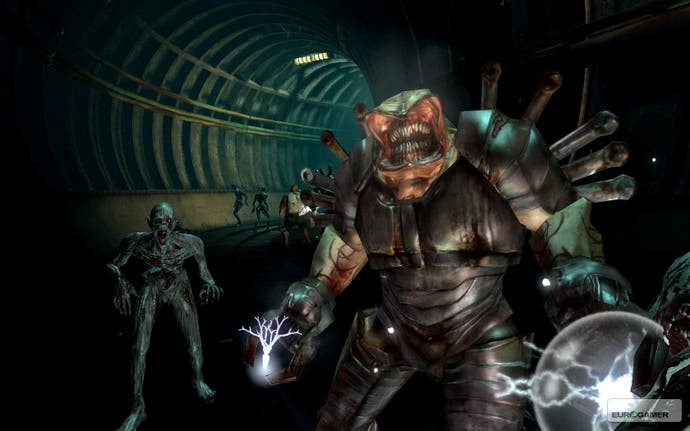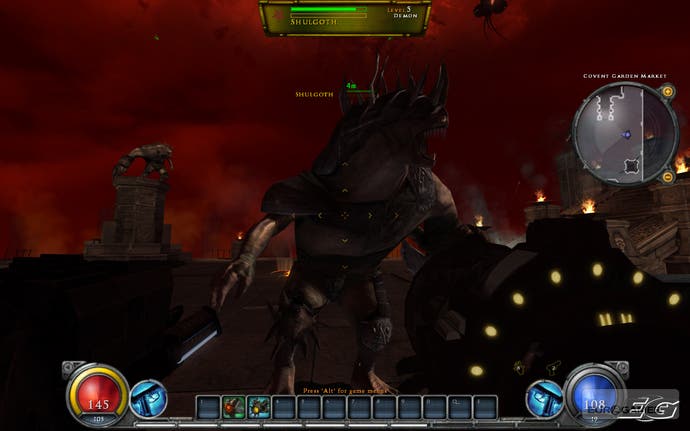Hellgate: London
Capital idea.
Sadly, Hellgate's recognition of issues like that which frustrate and annoy players is far from universal. The game's inventory is a completely frustrating, backwards affair, which has clearly been designed with an eye firmly on 1992 and a blind refusal to read anything that's been written on user interface design in the interim. Yes, boys and girls, it's the return of the ever-popular mini-game, "sort the inventory to make space for new items by shuffling old ones around".
You'll end up doing this at least once every ten minutes or so in Hellgate, and it's just as much fun as it has always been - in other words, about as much fun as poking yourself in the eye with a red chilli. In a game which makes much of having an option to colour-coordinate your armour, so it doesn't look like you mixed and matched it, the lack of an automatic function to sort out your damned inventory feels fundamentally ridiculous.
Love on the Northern Line
Throughout Hellgate's development, much has been made of the game's online functionality - to the extent that we have a sneaky suspicion that many people actually believe the game to be an MMORPG. This simply isn't true, we might add; first and foremost, in theory at least, it's a single-player action RPG.
However, it does certainly have a strong online component - and yes, there is an optional subscription fee which fully opens up the online experience. Even without paying any fees, though, you can still play online with other people. The fees unlock more MMORPG-style features such as the ability to participate in Guilds, and will be rewarded down the line with oodles of new content - or so the developers claim.

To be perfectly honest, at this point in time we're completely unconvinced by the idea of paying money for a monthly subscription to Hellgate. The free online features will probably be more than enough for the vast majority of players, and while we'd love to see the paid service evolving into something more worthwhile, right now we're not really clear on the value being offered here.
In multiplayer, Hellgate is definitely a good experience, and there are hours of fun to be had here with like-minded types. The game's tendency to be a fairly intense button-basher does, however, mean that most multiplayer experiences will be more about the camaraderie and extra firepower than about any kind of tactics or strategy. Multiplayer works in a manner not dissimilar to Phantasy Star Online, with safe areas where players can meet up, before venturing into instanced dungeons to take on creatures and quests.
One major caveat, though, is that if you're going to play online, you need to do so from the outset. Hellgate doesn't allow you to bring your offline, single-player characters into the online environment - not even to play with your friends. We understand the security concerns, to some extent, but it's still likely to be a frustrating discovery for many players (it certainly was for us).
The other glaring problem revealed by the online modes - but present in single-player as well - is that Hellgate isn't the most stable piece of software in the world. Although we only saw a couple of actual crashes in our play sessions (at least one of which can probably be blamed on a suspect ATI driver), we did experience gigantic problems with slow-down, which got progressively worse as we played the game for longer before eventually necessitating a restart.

Pressing the attack button in a busy area could drop us down to getting one frame every couple of seconds for half a minute or more at times. We sincerely hope that this gets fixed with a patch, but it's tough to review a game on the basis of bugs that may or may not be fixed down the line - just as it's tough to assess a subscription online service that may or may not justify its existence down the line.
Hellgate: London is filled with gorgeous artwork and dripping with atmosphere; it's got a delicious sense of humour and finely tuned combat systems that will be keeping action RPG nuts happy for a long time. Despite this, we've got vast reservations about key aspects of the game; the randomly generated levels feel increasingly hollow, pointless and gimmicky as you progress, the user interface is clunky in some important areas, and there are clearly some hefty bugs here that need patching.
Our reservations are balanced out against the obvious talent and effort that has been ploughed into the game - and the simple fact that every time we put Hellgate down, either during its extended beta period or while reviewing it, we were itching to get back to it within hours. It's compulsive, it's good fun and it's certainly addictive; perhaps as the online service evolves, it'll even be worth coming back to for a further evaluation. For now, though, this is a game too deeply flawed to deserve the masterpiece status we'd all hoped for.

